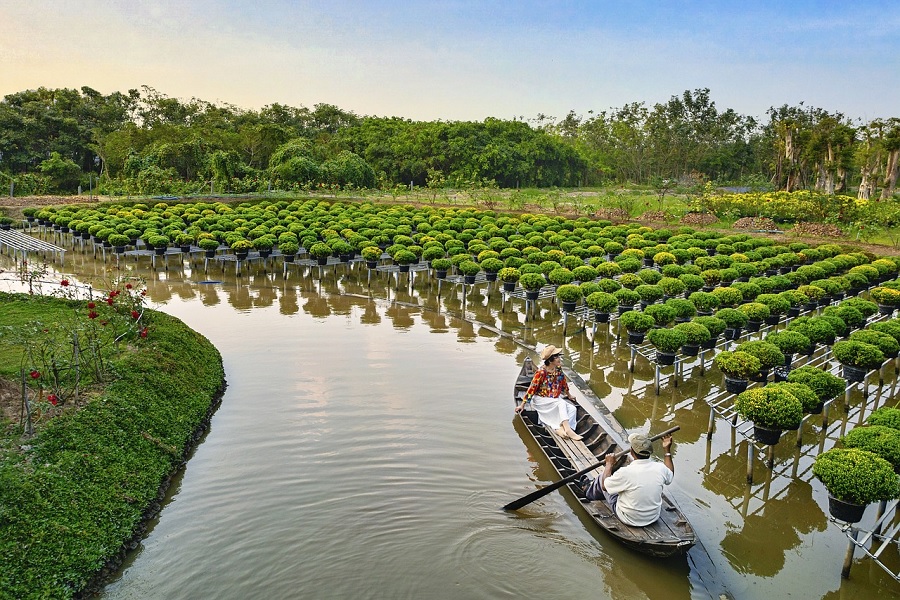Farm Vietnam Ecotourism: A Sustainable Way to Experience Nature

Vietnam is becoming an increasingly popular destination for ecotourism, and one of the most exciting trends is the rise of farm-based tourism. Known for its lush landscapes, vibrant culture, and rich biodiversity, Vietnam offers travelers a unique opportunity to connect with nature through farm Vietnam ecotourism. Here’s why farm-based ecotourism in Vietnam is becoming a must-visit for nature lovers and sustainability enthusiasts.
1. A Glimpse into Rural Life: Connecting with Local Farmers
Farm Vietnam ecotourism provides travelers the chance to experience traditional rural life firsthand. Visiting local farms allows tourists to engage with farmers, learn about their sustainable farming practices, and participate in day-to-day farm activities. Visitors can try their hand at organic farming, picking fresh fruits, or planting crops alongside the farmers, gaining a deeper appreciation for the hard work that goes into food production.
Hanoi Countryside: Outside of Hanoi, the countryside is home to rice paddies, vegetable farms, and organic farms where tourists can experience a day in the life of a farmer.
Mekong Delta: In this iconic region, visitors can take part in harvesting rice, fishing, or learning the art of traditional agricultural techniques that have been passed down for generations.
2. Supporting Sustainable Agriculture: Eco-friendly Practices
Sustainability is at the heart of farm Vietnam ecotourism. Many farms focus on organic farming and sustainable agricultural practices that minimize the use of chemicals and promote biodiversity. By participating in farm tours, tourists can learn about the importance of environmentally friendly practices and witness how farmers are working to protect the land while producing high-quality food.
Organic Farms in Da Lat: Da Lat, known as the “City of Flowers,” is famous for its organic strawberry farms, where visitors can pick their own fresh berries while learning about sustainable farming practices.
Bamboo Farms in Sapa: The northern region of Sapa offers bamboo farms that utilize eco-friendly methods to grow bamboo, which is then used for local crafts, building materials, and even food.
3. Agritourism Experiences: From Farm-to-Table Dining
A major highlight of farm Vietnam ecotourism is the farm-to-table dining experience. Many farms offer cooking classes, where visitors can prepare traditional Vietnamese dishes using fresh ingredients sourced directly from the farm. This hands-on experience is a great way to learn about Vietnamese cuisine while enjoying the authentic flavors of locally grown produce.
Cooking Classes in Phu Quoc: On the island of Phu Quoc, visitors can join cooking workshops that focus on traditional dishes like pho, banh xeo, and fresh spring rolls, using organic ingredients straight from the farm.
Farm Dinners in Mekong Delta: After a day on the farm, guests can enjoy a traditional Vietnamese meal prepared using locally sourced, organic ingredients.
4. Biodiversity and Conservation: Preserving Nature’s Beauty
Farm Vietnam ecotourism also emphasizes the importance of biodiversity and nature conservation. Visitors can explore pristine forests, wetlands, and protected wildlife habitats, learning about the unique flora and fauna of Vietnam. Many farms are located in regions known for their biodiversity, making them an ideal place for eco-conscious travelers who want to explore Vietnam’s natural wonders responsibly.
Cuc Phuong National Park: Near Hanoi, this park is home to various species of wildlife, including endangered primates and rare plants. Ecotourists can visit nearby farms that integrate conservation efforts with sustainable tourism.
Cat Ba Island: This UNESCO Biosphere Reserve offers tours that include visits to organic farms located within the island’s protected ecosystems, providing visitors with an opportunity to explore nature while supporting conservation.
5. Cultural Immersion: Learning from Local Communities
Farm-based ecotourism in Vietnam is not just about the land, but also about the people. Visitors have the chance to engage with local communities, learn about their customs and traditions, and experience authentic Vietnamese hospitality. Staying with local families or in eco-lodges provides a more immersive and intimate experience, offering a chance to connect with the culture in a way that traditional tourism cannot.
Ethnic Minority Villages in Sapa: Visitors can stay in homestays with local ethnic minority communities in Sapa, learning about traditional farming methods, local crafts, and village life.
Hoi An Organic Farms: Near the UNESCO-listed town of Hoi An, travelers can explore the town’s organic farms and learn about its rich cultural heritage through hands-on agricultural experiences.
6. The Future of Ecotourism in Vietnam
As demand for sustainable travel options grows, farm Vietnam ecotourism is poised to become an integral part of the country’s tourism strategy. By combining agriculture with eco-friendly tourism practices, Vietnam is paving the way for a more sustainable, responsible, and immersive tourism industry that benefits both travelers and local communities.




















